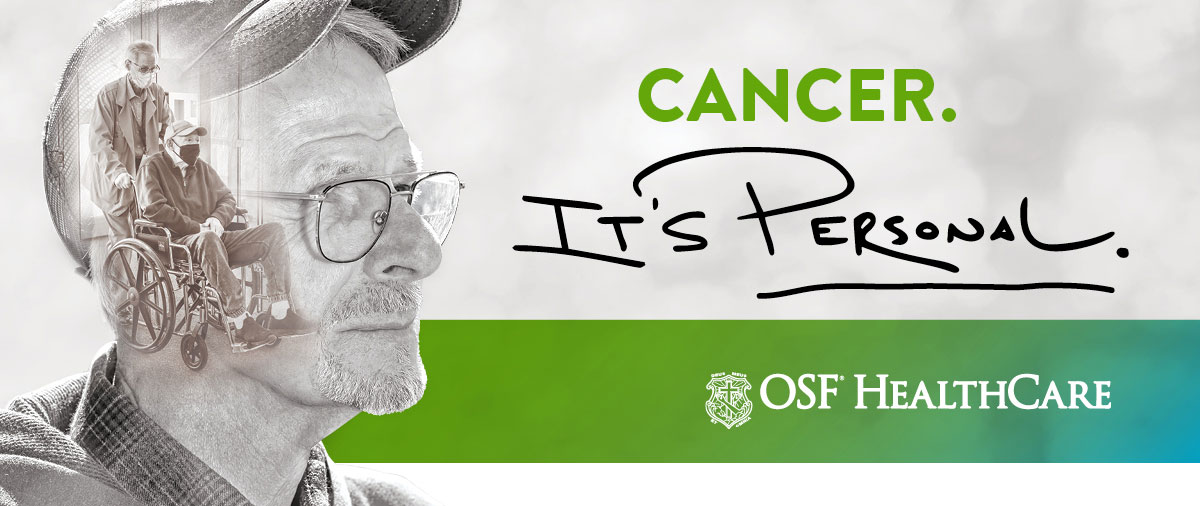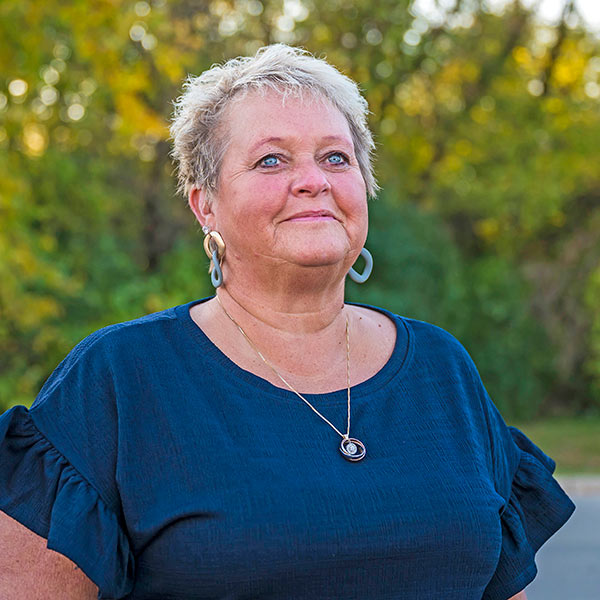
Let's talk
Learning you or someone close to you has cancer can be a scary and confusing time. And because no two cancers are alike, you don't need a one-size-fits-all approach to care. It can be easy to get lost in the confusion of testing and multiple appointments that follow.
Our nurse navigators will walk side by side with you from diagnosis and treatment to survivorship, answering all of your questions.
Get started by speaking with a nurse navigator.
Schedule Online Phone: (217) 431-4290Please use Option 6 when calling.
Get started by speaking with a nurse navigator.
Schedule Online Phone: (906) 786-5707Please use ext. 7087 when calling.

WHY CHOOSE OSF?
From primary care to extensive support services, the clinical experience and expertise of our care teams are why people initially come to us. But during this difficult time, our Mission to serve with the greatest care and love is what gives courage and hope.
Our board-certified oncologists, nurses, patient navigators, social workers, pastoral care team members and dietitians are focused on your physical, mental and spiritual needs throughout your individual journey.

FREQUENTLY ASKED QUESTIONS
Our nurse navigators are a single point of contact who will be there with you and your family every step of the way, answering all of your questions and making sure you fully understand your diagnosis and plan of care.
They help with financial assistance, schedule initial tests and consultations, and collaborate with members of the medical team to ensure information is current and understood by all the physicians, nurses and other team members.
Your nurse navigators can assist you with:
- Helping you and your family members navigate the comprehensive services available.
- Assessing the individual and personal needs of you and your family.
- Explaining the necessary information, education and resource materials you receive so you know what to expect throughout your treatment.
- Assisting with the coordination and scheduling of tests and services.
- Communicating with physicians, case managers, support service personnel, family members and others on your behalf.
- Supporting you and your family members by following up after your visit to talk about additional information and services available to you.
- Referring you to the appropriate physician office or other health care resource when clinic issues arise.
Whether you’re a patient, survivor or caregiver, the cancer journey is challenging. It can make you feel alienated from others.
We believe human connection can be strong medicine. Support groups allow you the chance to form bonds with people who know from experience what you are going through.
Share coping techniques, learn about new resources, find comfort and give comfort. You may find strength from the genuine and lasting bonds you form.
We encourage you to talk to your nurse navigator about support groups in your area.
Proper diet and nutrition can be a vital part of keeping your body healthy as it deals with cancer treatment's side effects.
Healthily fueling yourself can help raise your energy level and promote an effective immune system.
Our nutrition specialists work one-on-one to craft a sustainable diet plan to meet your unique needs and goals.
Or, if you prefer, you can share your nutrition questions and concerns with one of our nurse navigators. They are here to help set you up with a nutritionist to develop a personalized diet plan to help you through your cancer journey and beyond.
OSF HealthCare offers a complete range of medical imaging and diagnostic services for detecting and treating cancer.
You have full access to these diagnostic capabilities, allowing for convenient access, faster exam times and results. You don’t need to travel to different locations for tests, consultations and treatments.
Cancer Diagnostics Provided:
- 3D digital mammography
- Biopsy
- Bronchoscopy
- CT Scan – 64 slice, low-dosage
- Colonoscopy
- EGD
- Fluoroscopy
- Laryngoscopy
- MRI
- MRI – guided breast biopsy
- PET scan
- Ultrasound
Medical Oncology and Hematology
Chemotherapy is the use of medications to treat cancer. Chemotherapy helps destroy cancer cells by stopping them from growing and multiplying. It may be used with radiation therapy, surgery or both. More than one chemotherapy drug may be given at a time because some drugs work better together than alone. We have also added new immunotherapy and hormonal treatments to our list of services to keep you close to home and reduce the stress of traveling to different places for multiple treatments.
Following treatment, you may be tired and ill. Our infusion rooms are designed to reduce stress and provide comfort through this difficult time.
Hematology is the branch of medicine concerned with the study, diagnosis, treatment and prevention of diseases related to the blood. It involves treating diseases that affect the production of blood and its components, such as blood cells, hemoglobin, blood proteins, blood cancers and the mechanism of coagulation.
Radiation Oncology
Radiation therapy treatments use high-energy X-rays to target the cancer tissue while neighboring tissue is minimally affected. The radiation damages the tumor cells and can help prevent them from dividing. The goal is to slow or stop the growth of the tumor. In many cases, the tumor is completely destroyed.
Standard treatments include:
- 3D-CRT – three dimensional conformal radiotherapy
- IGRT – image-guided radiation therapy
- IMRT – intensity modulated radiotherapy technology
- Stereotactic radiosurgery
- Superficial radiotherapy
Surgery
OSF HealthCare offers a full range of surgical procedures for the diagnosis and treatment of cancer. Our surgeons are also experienced in surgical techniques designed to minimize the impact of surgery, such as lumpectomy, sentinel node biopsy and laparoscopic minimally invasive procedures.
Our compassionate approach to pain management, post-operative care and rehabilitation services is designed to return you to your normal routine as quickly and fully as possible.
The stage of a cancer indicates how much cancer there is and how far it has spread. The staging of a cancer is one of the most important things to know when deciding on treatment options.
Most cancers are staged using Roman numerals and can have a value of I (1), II (2), III (3), or IV (4). This is based on if the cancer is still contained in the area where it began, has started to spread into nearby tissues or organs or has spread to more distant tissues or organs (metastasized).
Stage I is the earliest stage. It usually means the cancer is still contained in the place it first started and hasn't spread. Stage IV is the most advanced stage. In this stage, the cancer has spread from the primary site to other parts of the body.
Unlike other kinds of cancer, there is no staging system for a cancer of unknown primary (CUP), the cancer was found after it spread from an unknown primary site. All CUPs are at least a stage II. And it’s likely that they're stage III or IV.
Many chemo medicines kill fast-growing cells. This means that they affect healthy cells that grow fast, as well as cancer cells. Because cells in hair follicles are fast growing, many chemo medicines cause hair loss. People can lose hair anywhere on the body – the head, eyebrows, eyelashes, facial and pubic hair. Loss usually occurs two to three weeks into treatment, depending on the medicines used. Once it starts to fall out, hair may just get thinner, or it may fall out altogether.
Just as each person is different, so is their reaction to treatment. Side effects may be severe or mild. Or you might not have any. Talk with our cancer team about the possible side effects of your treatment before treatment starts.
People often choose to wear wigs, scarves or hats while or after losing their hair. If this is what you'd like to do, pick them out ahead of time and start wearing them before your hair is completely gone.
Other ways to manage your hair during treatment include:
- Wash it less often.
- Use a gentle moisturizing shampoo.
- Don't use coloring products, perms or other products with strong chemicals.
- Don't use brush rollers, curling irons or blow dryers on hot settings.
- Consider cutting your hair short before you start treatment.
In almost all cases, hair grows back. The color or texture may be different at first. But it usually starts to grow about six weeks after you've completed chemo. As your hair grows back, try to limit shampoos to twice a week. Also, do not use chemical products like perms or straighteners until the hair has regrown. Permanent or semi-permanent hair coloring should not be used for at least three months after treatment ends.
Some cancer treatments, such as radiation, chemotherapy and biotherapy, have side effects. Side effects happen when the treatment, in trying to kill the cancer cells, kills healthy cells. Not everyone has side effects, and side effects depend on the type of cancer and treatment. Side effects usually go away when treatment ends.
Common side effects include:
- Blood problems
- Depression
- Fatigue
- Fever
- Hair loss
- Nausea
- Skin rash
- Vomiting
What Our Patients Say

Bud
OSF HealthCare patient
When you think life has given up on you, don’t give up. Keep your faith.

Brandie
OSF HealthCare patient
Everybody has a purpose. Mine is my children. That's why it's personal.

COVID-19
Appointment Safety
Your health and safety is our top priority, so we are taking extra precautions during your office visits and treatments.
Those include:
- Limiting visitors
- Screening patients and employees at entry
- Spacing out appointments
- Requiring everyone to wear masks
- Limiting the time patients spend in our waiting areas


